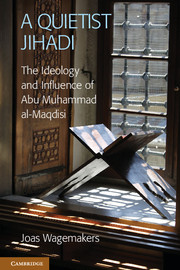Book contents
- Frontmatter
- Contents
- Preface
- Acknowledgements
- Glossary
- Note on Transliteration
- Introduction
- Part I Al-Maqdisi's Life and His Place in the Jihadi Ideological Spectrum, 1959–2009
- Part II Al-Maqdisi's Influence on the Saudi Islamic Opposition, 1989–2005
- 4 Saudi Arabia's Post–Gulf War Opposition
- 5 Al-Qaʿida on the Arabian Peninsula
- Part III Al-Maqdisi's Influence on the Development of al-Walāʾ wa-l-Barāʾ, 1984–2009
- Part IV Al-Maqdisi's Influence on the Jordanian Jihadi-Salafi Community, 1992–2009
- Bibliography
- Index
- References
4 - Saudi Arabia's Post–Gulf War Opposition
Published online by Cambridge University Press: 05 July 2012
- Frontmatter
- Contents
- Preface
- Acknowledgements
- Glossary
- Note on Transliteration
- Introduction
- Part I Al-Maqdisi's Life and His Place in the Jihadi Ideological Spectrum, 1959–2009
- Part II Al-Maqdisi's Influence on the Saudi Islamic Opposition, 1989–2005
- 4 Saudi Arabia's Post–Gulf War Opposition
- 5 Al-Qaʿida on the Arabian Peninsula
- Part III Al-Maqdisi's Influence on the Development of al-Walāʾ wa-l-Barāʾ, 1984–2009
- Part IV Al-Maqdisi's Influence on the Jordanian Jihadi-Salafi Community, 1992–2009
- Bibliography
- Index
- References
Summary
As we saw in Chapter 1, al-Maqdisi was heavily influenced by the time he spent in Saudi Arabia and the Wahhabi writings he found there. He has nevertheless been a staunch critic of Saudi Arabia and Wahhabi scholars who are loyal to its regime. This not only shows that Wahhabi writings can be used in both pro- and anti-Saudi ways, but it also makes clear how al-Maqdisi uses the Wahhabi tradition, which is mostly adopted by quietist Salafis, for jihadi purposes, thereby further underlining his position as a quietist Jihadi-Salafi.
In this chapter, we will look first at the history of Wahhabi opposition to the Saudi system from within the country itself, especially the wave of opposition to the regime after the Gulf War of 1990. The chapter then focuses on al-Maqdisi's ideas on Saudi Arabia, what impact they have had on the post–Gulf War opposition until 1995 and how this influence can be explained. The year 1995 was chosen because this is when the phase of post–Gulf War opposition more or less came to an end.
Wahhabism and the Saudi System
The past two decades have seen the publication of a relatively large number of studies on the history of Wahhabism, ranging from the apologetic to the highly critical and everything in between, as well as the history of Saudi Arabia in general4. From these and other studies, we learn that the Saudi state began with the territorial ambitions of Muhammad b. Sa‛ud (d. 1765), the ruler of al-Diriyya, a settlement in the central Arabian region called Najd. His pact in 1744 with fellow Najdi Muhammad b. ‛Abd al-Wahhab (1703–92), the strict Salafi reformist scholar whose ideas would become known as ‘Wahhabism’ and gave Ibn Sa‛ud religious legitimacy, became the basis for three Saudi states. The alliance conquered large parts of the Arabian Peninsula and set up an emirate with al-Dir‛iyya as it capital. The families of the two men – the Al Sa‛ud and the Al al-Shaykh – have formed the two pillars of the state ever since, from the first Saudi realm (1744–1818), through its successor (1824–91) to the current state of Saudi Arabia (1932–).
- Type
- Chapter
- Information
- A Quietist JihadiThe Ideology and Influence of Abu Muhammad al-Maqdisi, pp. 97 - 119Publisher: Cambridge University PressPrint publication year: 2012



